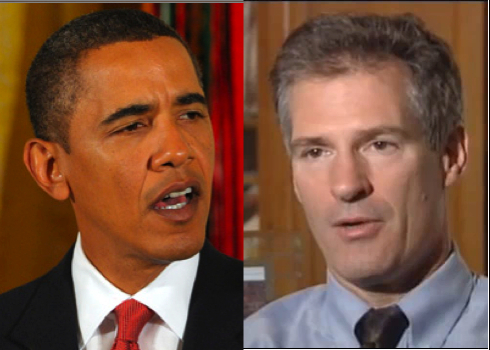As the final Wall Street negotiations came to a close last week, the Obama administration quietly sided with Sen. Scott Brown (R-MA) against most Democrats in support of a loophole in one of the key provisions of the financial reform bill.
Several Democratic Hill aides tell TPMDC that the Treasury Department, which wielded tremendous influence over the shape of the legislation, changed its position on the Volcker rule during the final deliberations, endorsing an exemption that will allow banks to invest in outside hedge funds.
“Treasury’s official position went from opposed to [the loophole] to supportive,” one aide says. “They may have [even] overshot Brown’s desires by a bit.”
The variant of the Volcker rule in the Wall Street reform bill, authored by Sens. Carl Levin (D-MI) and Jeff Merkley (D-OR), is meant to limit the extent to which federally insured financial firms can make risky bets with their profits.
In siding with Brown, the administration tacitly accepted that Sens. Russ Feingold (D-WI) and Maria Cantwell (D-WA), who opposed the bill from the left, would continue to oppose it after the conference committee. From the outset of the 111th Congress, Senate leaders and the White House have frequently tailored legislation to the demands of conservative Democrats and moderate Republicans who, in their view, hold the keys to breaking filibusters. In the weeks since the Senate financial reform bill passed, communication between top Democrats and Feingold and Cantwell had largely stalled, while Brown remained at the center of the action — and his central focus was on retaining his hedge fund loophole.
In the weeks leading up to the conference committee, several Democrats, including former Fed Chair, and top White House surrogate Paul Volcker himself, spoke out against the exemption. But in a statement released today, Volcker came out strongly in support of the legislation, despite the fact that the loophole survived.
Democratic leaders and the White House have long considered Brown the linchpin of financial reform. Because of Feingold’s and Cantwell’s opposition, Democrats had to rely on a small handful of Republicans to push the bill over the finish line. Brown was believed to be the 60th, filibuster-breaking vote, and ultimately won his exemption.
Opinions vary as to whether top Democrats on the Hill and in the White House did enough to persuade Feingold and Cantwell to change their votes, which would have robbed Brown of much, if not all of his leverage. Some place the blame for the outcome at Feingold and Cantwell’s feet: Brown wouldn’t have won his loophole if one or both of them had been willing to flip their votes in exchange for a more restrictive Volcker rule. Others argue that the administration always places too much faith in moderate Republicans and simply sought to avoid antagonizing Brown, who will likely be a swing vote on future legislation.
One Treasury official says it came down in the end to the need to break a filibuster.
“It’s a matter of counting votes,” the official said, adding that Treasury and Senate Banking Committee Chairman Chris Dodd would have backed a more restrictive version of the rule if Feingold or Cantwell had dislodged. Once it became clear that Feingold and Cantwell were out “Brown knew he had the upper hand.”
Not only did he have the upper hand, but he had the backing of the most powerful member of the conference: fellow Bay Stater and Financial Services Chairman Barney Frank. Last month, in a move partially designed to appease Brown, Frank wrote two letters to Senate leaders supporting Brown’s position on the issue, which he said was enshrined by the House bill. “The bill that passed the House does not prohibit depository institutions or their parent holding companies or affiliates from…limited fund sponsorship and investment to meet the needs of their clients as part of traditional asset management activity,” the second letter reads.
“[T]hese measures are important to our state and none of them threaten or weaken the broad objectives of comprehensive reform that guided our work,” Frank wrote in the first letter.
You can read both letters here.
Now, in an irony of ironies, Brown is threatening to oppose the bill anyway over an unrelated fee on banks added to the legislation during the final hours of the conference committee. That, combined with the death this morning of Sen. Robert Byrd (D-WV), will make final passage of the Wall Street reform bill a steeper climb.










